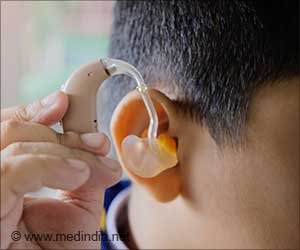Researchers Find Hearing Loss Link in Autism Spectrum Study

“Hearing impairment may have an impact on the higher-level auditory system and, eventually, cognitive function,” said researchers. Previous studies of aging-related hearing loss showed that the brain can increase its response to make up for reduced auditory signals from the inner ear. Researchers wanted to find out if this increase, called central gain, could contribute to abnormal brain response to sound in ASD.
However, they did not have a clinically relevant model to directly test this important fundamental question. Researchers developed a preclinical model in a laboratory to test this hypothesis. Mice in this model have only one working copy of a gene called MEF2C. Others had studied MEF2C in the past for its role in brain development and found that it was important for regulating circuit formation in the brain. They became especially interested in creating a preclinical model when a group of patients with ASD-like symptoms were identified with MEF2C mutations.The models also show ASD-like behaviors, including increased activity, repetitive behavior and communication deficits.
Researchers first measured the response of the brain to auditory signals, using a modified version of a test that is commonly used to screen newborn infants for hearing loss. Mild hearing loss was observed in the mice with only one working copy of MEF2C while hearing remained normal in those with two working copies. To investigate this loss further, the researchers measured the activity of the auditory nerve, which carries signals from the inner ear to the brain. They found reduced activity in this nerve in mice with only one copy of MEF2C.
With their sights set on the auditory nerve, the researchers used advanced microscopes and staining techniques to determine what was going wrong. Although the overall hearing sensitivity loss was mild, the researchers were excited to see a big difference in auditory nerve response. Nerves from mice with a single copy of MEF2C showed cellular degeneration much like that seen in age-related hearing loss. The researchers also saw signs of increased inflammation, with disrupted blood vessels and activated immune cells called glia and macrophages. This finding was especially surprising to the researchers.
Advertisement
Glial cells were not their first thought, they thought it was a neuronal change. However, now they understand that auditory nerve activity can also involve the immune system. Researchers also believe that the finding opens the way for a new area of neuroscience research.
There is an important interaction between the immune system in the body and the immune system in the brain. The two systems play critical roles in shaping how nervous system cells communicate with each other, in part, by pruning excess or inappropriate connections that have formed, and this is an essential aspect of healthy brain development and function.
The findings from this study could be important not only for patients who are MEF2C deficient but also for people with ASD or hearing loss as a whole.
Understanding how this gene may be participating in ear development and how the inner ear development is affecting brain development has tremendous applicability.
In future studies, the researchers aim to discover how exactly MEF2C causes the changes that were identified in this study. The research team also hopes to explore these findings in patients with MEF2C deficiency using non-invasive hearing tests.
Reference :
- Peripheral Auditory Nerve Impairment in a Mouse Model of Syndromic Autism
– (https:www.jneurosci.org/content/42/42/8002)
Source: Medindia
Source link
#Researchers #Find #Hearing #Loss #Link #Autism #Spectrum #Study



